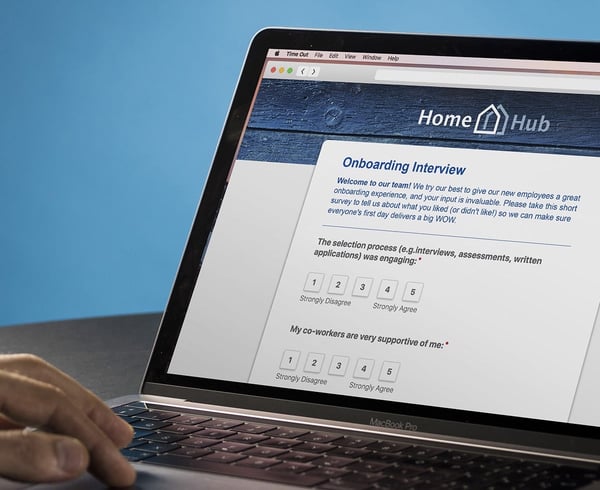3 tips to improve engagement in your listening strategy
Surveys can be your best friend or your enemy. When done well, they provide you with invaluable insights and information – and they help give your people a voice.
 But when they miss the mark, they can be boring, annoying and a waste of time (for you and your people.) And when they aren’t followed up on, they can even increase frustration and make a problem seem worse to employees.
But when they miss the mark, they can be boring, annoying and a waste of time (for you and your people.) And when they aren’t followed up on, they can even increase frustration and make a problem seem worse to employees.
Over the years, I’ve been responsible for people analytics, designed listening strategies and created many, many survey campaigns. Along the way, I’ve picked up a few things.
When I speak to organizations and business leaders, everyone understands the value of surveys – but almost everyone is concerned with ‘survey fatigue.’
What is survey fatigue?
 Not sure what I mean when I say "survey fatigue"? (Lucky you!) Simply put – survey fatigue is when your people get bored with or disinterested in your surveys. It usually impacts you on two occasions. First, right before the survey (people make a decision not to respond) and then during the survey (people drop-out midway through.) When this happens, your response rates suffer and so does the accuracy of your data.
Not sure what I mean when I say "survey fatigue"? (Lucky you!) Simply put – survey fatigue is when your people get bored with or disinterested in your surveys. It usually impacts you on two occasions. First, right before the survey (people make a decision not to respond) and then during the survey (people drop-out midway through.) When this happens, your response rates suffer and so does the accuracy of your data.
How do we avoid it?
We know that fatigue normally happens when people become fed-up with or bored of surveys. Sometimes, people get bored of surveys because they are too frequent, difficult or time-consuming. And, they often become fed-up when they believe that nothing happens as a result of the survey – when they don’t see action.
But, we all know the value that surveys can bring, and we want to find that gold.
You know, those amazing insights that surveys provide – the ones that help you learn about your culture, make improvements, and capitalize on opportunities.
So, I thought it’d be helpful to share my experiences and tips on how to avoid survey fatigue, and get the best from your research. There are three key things that will help you transform your approach.
Here we go:
1. Start with Purpose - A great start is to clearly communicate the purpose upfront – your reason for conducting the survey. Also, share how long it will likely take to complete. This way, you're clear with the expectations and people can prepare themselves for what’s ahead, setting aside the right amount of time.
2. Survey Design - When people drop out midway through a survey, it’s usually because it’s too long, too difficult or repetitive. So, it’s important to consider these three factors when designing the survey. For example, simplifying the questions as much as possible can improve your response rates and the perception that your survey is "too difficult." To do this effectively, I recommend:
- Asking direct questions.
- Limiting your open-ended questions.
- Focusing on asking one question at a time. (don’t make them scroll!)

3. Sharing Results and Improvements - One of the biggest frustrations employees have with surveys is not knowing what the business does with the data. This can sometimes create distrust, as people begin to speculate and wonder how the data is being used. Also, when employees are in the dark and can’t see tangible improvements, they give up faith in the process, and stop filling out surveys.
To prevent this from happening, I always recommend two important steps in your survey campaigns:
- Share the results - After the survey is over, a simple wrap-up message thanking people for their responses is important. I recommend speed over being thorough in a first, immediate message. What data can you comfortably share quickly? Maybe it's just the percentage of responses. Get that message out quickly and - as necessary - let people know there will be more detail to come. When you share more thoughtful results it may be by distilling key information to your managers to share with their teams, or by producing an all-company blog post with core information that employees can react to. It’s an awesome recognition moment to celebrate successes. While it can be a little nerve wracking to be so transparent, keep in mind that being transparent is critical if you want people to continue providing quality feedback.
- Commit to improvements - People want to see that their voice is being heard, and that it’s making a difference. In fact, it’s a core building block within one's sense of belonging. I see many businesses skipping this step, and it’s such an easy one - because most businesses are actually committing to improvements and actions following a survey (the hard stuff) but forget or skip the part where they tell their people what they’re doing (the easy bit).
- Celebrate as improvements are made - Just as we miss celebrating individual successes, we often skip this step as a company. Did you take action based on a survey? Don’t assume people will notice. Point this out and thank them for their feedback. Preparing for the next survey? Remind people of the improvements you’ve made in the past based on their feedback. This will make them more likely to share their input in the moment and into the future.
Simply sharing even three things that the business is committed to as a result of the survey feedback can really help create a positive feedback culture in your organization. You can also rally your people around these positive changes, and celebrate when you achieve them. This is gold.
The right mix of surveys, communication and recognition can help your organization build trust, community and connections. If you’re looking to up your survey game, we have some amazing tools and practices to help you. Contact our team to learn more.

%20(1).jpeg) Alexandra Powell
Alexandra Powell






